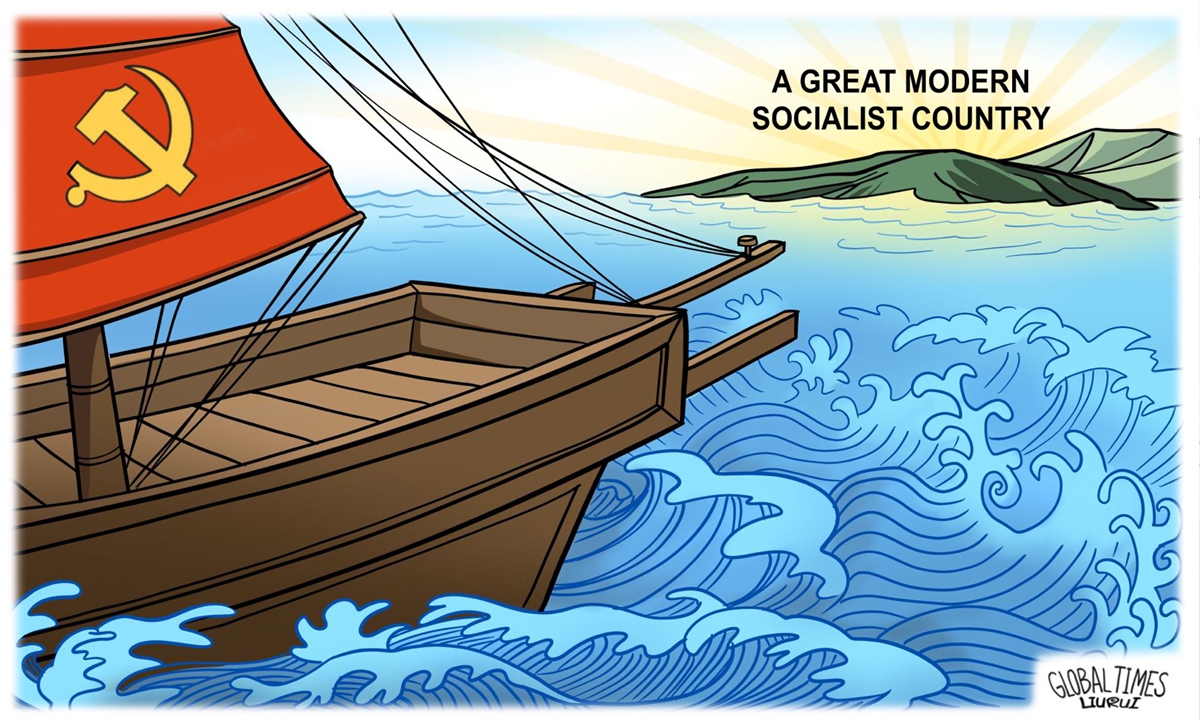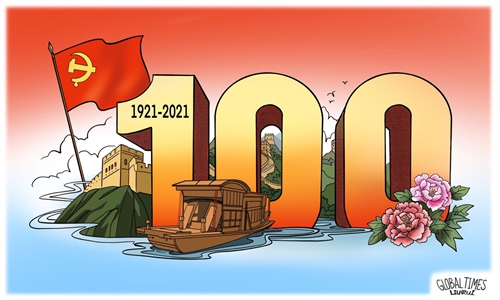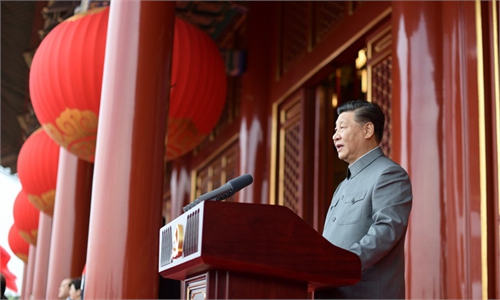Nothing can stop China toward its second centennial goal: Global Times editorial

Illustration: Liu Rui/GT
The ceremony to celebrate the centennial of the Communist Party of China (CPC) in Tiananmen Square on Thursday has attracted global attention, and the achievements of the Chinese people under the leadership of the Party and the beautiful vision of China's future development are increasing the sense of crisis among some Western elites. While they bad-mouth China, they are worried because they feel that China's development will continue to be unstoppable.Regardless of their attitude toward China, most US and other Western elites tend to believe that China's GDP will surpass that of the US in a decade or less, and most of them also believe that the US' military and technological advantages over China will shrink further as time passes. Although many have claimed that China's stability was achieved through economic growth and controls and tried desperately to search for internal tensions in China, few Western forces believe that China would get out of control politically.
The confrontation staged by those US and West forces are actually proving China's steady modernization. Although they are devising and implementing ways to thwart China's development, the focus of their scheme is already shifted to how to deal with an increasingly powerful China.
After achieving China's first centennial goal of building a moderately prosperous society in all respects, the Chinese feel very confident in reaching the second goal of building a great modern socialist country. This is not false bravado. Support for this is so solid that Western anti-China forces can't weaken them.
First, the leadership of the CPC continues to strengthen, and this is China's biggest political advantage. The CPC's leadership of the country has been the focus of attacks on China by Western media, whose past narratives of the theory of Western-style democracy and multi-party political practices have deceived some Chinese. It can be said that strengthening the Party's leadership has been moving forward in resistance to the demagoguery of Western media, and its achievements are the result of both self-improvement and external pressure. Today, Chinese society believes more firmly in the importance of the Party's leadership. Just as General Secretary of the CPC Central Committee Xi Jinping said on July 1, "Any attempt to divide the Party from the Chinese people or to set the people against the Party is bound to fail. The more than 95 million Party members and over 1.4 billion Chinese people will never allow such a scenario to come to pass."
Second, China's development path comes from realities. It is a path that has formed from scratch through practice. Our continued success has contributed to a theoretical awakening in Chinese society. We are beginning to think that the Western approach is not universal and realize that we may be creating a new form of civilization. Now, it is the West that is showing its lack of confidence in its path, while China is gradually beginning to gain the upper hand in the battle over confidence with the US.
Third, the formation and form of conflict between China and the US have also changed. The US with its allies is exerting ideological pressure on China, while more social forces in China coming to the frontline of the war on focal issues, such as human rights, rather than letting the government carry the pressure alone. Western media used to rampantly stir things up in the Chinese public opinion arena. Now, it is much harder for them to do so, and they are relentlessly attacked and mocked by the Chinese public.
Fourth, the US is not able to thwart China's modernization, although it is stronger than China in terms of national power. The gap cannot cause fatal damage to China. For example, the US has a strong military, but this won't bring it absolute advantage in the western Pacific. Also, the US fears most China's economic growth. Its weak ability to engage in an economic game with China cannot be offset by the US' military advantage.
China has never set its goal solely on dealing with the US. For China, resisting the US' hostile policy is the same course of developing itself. China doesn't need to make much extra efforts aside from focusing on development. But the US needs to set a special agenda to deal with China. In other words, China deals with the US through further development, while the US has to undermine its interests to design a China policy.
With many favorable factors within our control, China can predict the future confidently. We will be able to reach the second centennial goal like we reached the first one. China will be the final winner.



